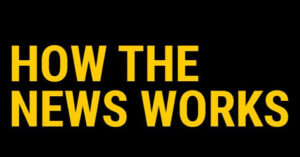Media pitfalls
The news media serve us well in many ways, but in other ways, their shortcomings are predictable:
Negative
- First inflation is bad, then deflation is bad. The weak dollar is bad, then the strong dollar is bad. Higher oil prices are bad, then lower. Automation eliminates jobs (but creates about as many). Americans are unhappy (when polls show them happy).
- The reporter at a disaster is doom and gloom, while the victims behind are calm and collected. At one house they are joking while cleaning up, but the camera zooms in on another house where a woman is sobbing.
- The media report a problem as hopeless in one region, not how it’s been solved in another.
- They spend a lot of time on dysfunctional families, not on how and why other families functions very well.
Inconsistent
- Now we have too many schools and teachers, now we don’t; college drinking is up, now it’s down – the same with education, fitness, family, etc.
Polarizing
- Haves vs. have-nots, tenants vs. landlords, labor vs. management, poor vs. rich, young and old, east and west, blacks and whites, students and teachers, business and consumers.
Tasteless
- Playing rock music while showing sorrow at the Vietnam Memorial, the legendary rudeness of some reporters, and trash TV [some daytime talk shows].
Sexual titlation
- Everyone’s in bed and no one gets pregnant, has their education cut short, or has to raise a child by oneself.
Shortsighted
- Our problems are somehow unique. Our values and methods come first. Every country is compared to ours.
Unbalanced
- Cities get more coverage than towns. – The New York press determines what is national news. – England was favored in the Falklands War. – Whites who oppressed blacks (So. Africa) were somehow worse than blacks who starved blacks (Ethiopia). – A lot about V-E Day, almost nothing about V-J Day, on their 40th anniversaries.
- Other stories haven’t gotten their share: l0 million Ukrainians were starved by Stalin in 1932; 1/6th of the Tibetans were killed by the Red Guards; slavery is practiced in Sudan and Mauritania.
Liberal
- Those with more are guilty; those with less are victims, capitalism is bad, conservatives are mean.
- When AT&T was broken up and banks deregulated, these were reported as helping the rich and hurting the poor.
- When the poor are forced out of a neighborhood, it’s a tragedy; when the middle class or a business is forced out, it’s not.
- Reporters pity bums and criminals, rarely talking to those they victimize: merchants, insurance companies, employers, credit bureaus, teachers, police, utilities, etc.
- Reporters focus on the poor who don’t work, not the poor who do, on those who riot, not those who don’t, on prisoners, not guards.
The media are made up of fallible, political humans.
- On the positive side they are bright, educated, and articulate. Many try to be accurate and objective. Their exposés have often been invaluable.
- On the negative side they are often negative, inconsistent, polarizing, myopic, and liberal. They often distort, over-dramatize, and lack taste.
- You have to be aware of their shortcomings and take the news with a grain of salt.

